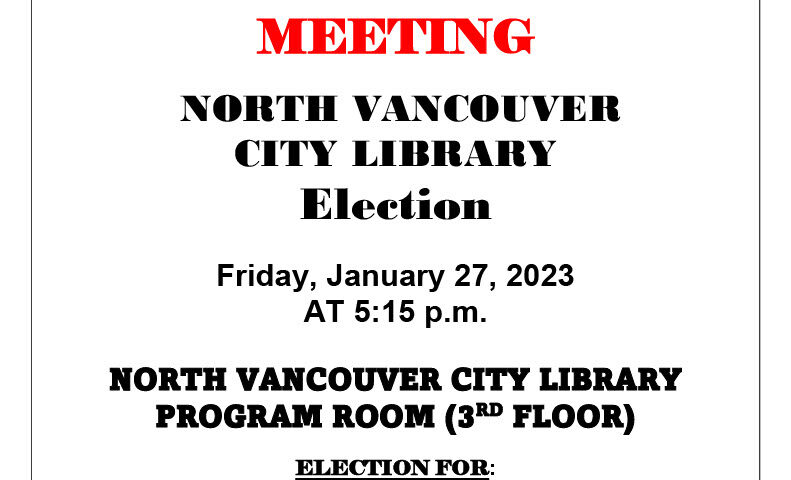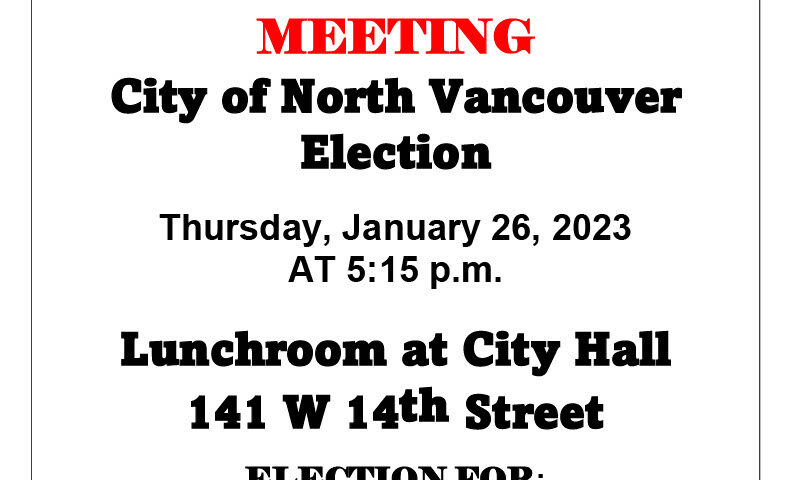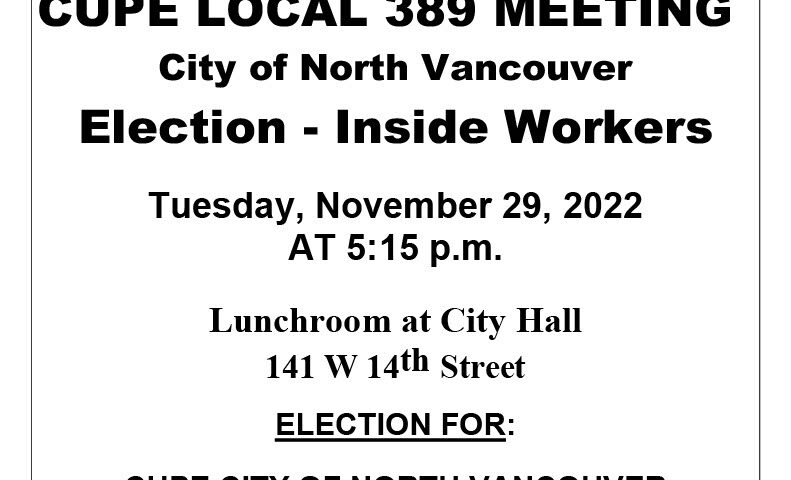CUPE LOCAL 389 MEETING
North Vancouver City Library
Election
Friday, January 27, 2023
at 5:15 p.m.
Program Room at City Library (3rd Floor)
ELECTION FOR:
CUPE UNION CITY LIBRARY REPRESENTATIVE
SHOP STEWARDS
HEALTH & SAFETY COMMITTEE MEMBERS

North Vancouver City Library
Election
Friday, January 27, 2023
at 5:15 p.m.
Program Room at City Library (3rd Floor)
ELECTION FOR:
CUPE UNION CITY LIBRARY REPRESENTATIVE
SHOP STEWARDS
HEALTH & SAFETY COMMITTEE MEMBERS

North Shore Neighbourhood House
Election
Friday, January 20, 2023
at 6:30 p.m.
Inman Room at North Shore Neighbourhood House
ELECTION FOR:
CUPE UNION REPRESENTATIVE

City of North Vancouver
Election – Inside Workers
Thursday, January 26, 2023
at 5:15 p.m.
Lunchroom at City Hall
141 W 14th Street
ELECTION FOR:
CUPE CITY OF NORTH VANCOUVER INSIDE REPRESENTATIVE
(The following was sent by email to all the members and friends who joined the CUPE 389 Email list or who provided their email address to us. Under Bernard v. Canada (Attorney General), the Supreme Court of Canada found that Unions may contact their members without specific permission granted under the Privacy legislation, but we do not wish to send you email unless you wish to receive it, and therefore all members who want to be removed from our email list can request it by emailing )
The CUPE 389 Committee met with the District of North Vancouver on a number of occasions through the Summer and the Fall. The Employer requested we participate in an expedited process out of what they said were concerns for the welfare of their employees, given the escalating cost of living, which we took to mean a desire to reach a fair collective agreement quickly.
The Employer made a proposal that we believed fell short of what our members expected under the existing economic conditions. When the Union countered this proposal, the Employer decided to end the process and stop the discussions. They advised us they would be engaging Metro Vancouver labour relations negotiators and were not available until at least January of 2023, and possibly later.
While we were not surprised that the Employer rejected the Union’s proposal, we were surprised that they decided to end the dialogue altogether, rather than to continue bargaining, given their previously-stated concerns about concerns about the welfare of the employees. We urged the Employer’s negotiators to continue the discussions and to put our heads together to arrive at a renewed collective agreement that worked for both parties, to no avail.
Many of our members cannot afford to live in the community in which they work. They spend additional hours of their lives commuting from the suburbs through gridlock traffic. The costs of their mortgages are skyrocketting. The financial strain is impacting their health and welfare, and those of their families. As we have shown in Ontario, for our K-12 members, we are not a Union that shies away from a fight if necessary, and neglects our duty to assure our members, who work in the wealthiest community in British Columbia, receive a fair wage increase based on the economic realities.
We ask you to support us by continuing to dilligently perform your duties and to keep an eye on future announcements. We are hopeful at achieving a deal that works for all, without the necessity for job action, but we will not shy away from doing whatever we need to, in order to reach a fair contract for our members. However, we can only do this if we have your support.
We thank our management partners, our elected leaders, and all those who work to make life better. As builders, we recognize how hard it is to build, and how easy it is to tear down. We do not view the world as an “us vs. them” and we value and respect the contributions of managers and excluded staff whose work is often thankless and challenging. However, we believe this moment needs courageous leadership and we call on our elected officials to extend to the workers the same rationalle they extended to their own wage increases.
We are still available and willing to talk to the Employer at any time, and to consider any and all proposals. However, unless the Employer reverses on their stated intentions, we do not anticipate a new agreement until well into the Spring of 2023.
We are continuing to meet with the employer and working on the best outcome for our members.
The Provincial Framework Agreement was reached between the K-12 Presidents’ Council and the BC School Employers’ Association on behalf of the Province of British Columbia reached a fair collective agreement that includes a three-year contract with the following wage adjustments:
2022: $0.25/hr + 3.24%
2023: 5.5% adjustment + 1% if cost of living exceeds 5.5%
2024: 2% + 1% if cost of living exceeds 2%
In the event the cost of living remains high, the agreement will have adjustments of 6.5% in the second year and 3% in the third year.
The Province has also provided approximately $1.2 mil over three years for our Local negotiations, which is to be allocated to local priorities through negotiations between your bargaining team and the Employer. We have had a number of meetings and are hopeful to be able to reach an agreement soon. All pay adjustments will be retroactive to July 1, 2022.
District Bargaining Committee:
————————————————————
Yvette Mercier, President
Tony Volpe, 2nd Vice-President
Brian Warman, Secretary-Treasurer
Kolton Smith, Dinesh Kapoor, Ryan Wood, Unit Representatives
Dan Todd, CUPE Staff Negotiator
School District Bargaining Committee:
————————————————————
Yvette Mercier, President
Brian Warman, Secretary-Treasurer
Dawn Gabert, Anthony Sevilla, Rob Carter, Unit Representatives
Dan Todd, CUPE Staff Negotiator
The nine-union Community Social Services Bargaining Association (CSSBA) has not been back to the negotiations table since the last update that we shared with you in early November, but we wanted to let you know what is happening with the negotiation of your new collective agreement in the Indigenous Services, General Services, and Community Living sub-sectors.
As you know, we have been hard at work for many months, negotiating with the representatives of the employers’ association, and bringing forward the priorities that you identified. These priorities include fair and equitable wages to address rising costs, meaningful recognition of rights for Indigenous workers and your ability to address your own health needs, including mental health supports.
We have made progress at the table and have made many agreements on monetary and non-monetary priorities. However, at this point, we remain significantly far apart from the employers on a few key priorities in all three sub-sector community social services agreements.
We are working towards true reconciliation which means that all Indigenous workers are respected, and their cultural needs are valued. Our work at the negotiations table is in line with a shared commitment to reconciliation, and we believe that this should be reflected in improvements to your collective agreement.
We will continue to fight for the best collective agreement that values you and the work that you bring to your workplace and to your community. We are working towards an agreement that not only puts more money in your pocket but enables you to take care of your health and have a safe workplace.
We are also working to address a systemic issue with our community social services sector: recruitment and retention. We are working hard to bring all of your priorities to the table and to make your work more supported and attractive to new workers in the sector.
What comes next?
We had hoped to be able to schedule additional bargaining dates before the end of this calendar year, but due to scheduling challenges, that is not possible. We are now looking at bargaining dates in the New Year and we will keep you in the loop as we move forward.
In the meantime, it is critical that you keep your contact information up-to-date with your union stewards along with your workplace contacts so we can keep you informed as we move forward.
And please, share this bulletin with your co-workers to make sure that everyone in your workplace has a signed union card.
We thank you for all of your support!
In solidarity, Your Community Social Services Bargaining Association (CSSBA) Negotiating Committee:
Andrea Duncan, CSSBA Negotiating Committee Chair
Angela Reed, BCGEU
April Duffield, BCGEU
Brian Calderwood, BCGEU
Jessica Daigneault, BCGEU
Kari Bepple, BCGEU
Katelynn Banky, BCGEU
Linda Rowley, BCGEU
Melissa Linn, BCGEU
Pamela Pye, BCGEU
Patricia Phillips, BCGEU
Rene Francis, BCGEU
Tammy Lewis, BCGEU
Wynn Hartfelder, BCGEU
Sheryl Burns, CUPE
Gabrielle Cameron, CUPE
Bob Crozier, CUPE
Lee-Ann Lalli, CUPE
Valeria Mancilla, CUPE
Mike Varga, CUPE
David Heuspe, HEU
Cheryl McLachlan, HEU
Loise Peloquin, HEU
Colin Brehaut, HSA
Dawn Marie Goodmurphy, HSA
Shelley Moore, LiUNA! Local 1611
Michael Reed, CUPE Staff
Christina Lloyd-Jones, HEU Staff
James Coccola, BCGEU Executive Vice President
Selena Kongpreecha, Lead Negotiator
From: bulletin_CSSBA_An_update_from_your_community_social_services_bargaining_association_2022_11_29

Membership Meeting Notice November 28, 2022
NVPES Meeting Notice – November 28, 2022
[advanced_iframe src=”https://us02web.zoom.us/meeting/register/tZ0rdu6grD0sHNfKJnk57c3M6s2vdFd9dWt1″ width=”100%” height=”600″ iframe_hide_elements=”footer-new”]

City of North Vancouver
Election – Inside Workers
Tuesday, November 29, 2022
at 5:15 p.m.
Lunchroom at City Hall
141 W 14th Street
ELECTION FOR:
CUPE CITY OF NORTH VANCOUVER INSIDE REPRESENTATIVE

With our fellow education workers in Ontario facing an unprecedented attack on their rights and their ability to serve students, B.C.’s K-12 Presidents Council is sending a message of support and solidarity to the Ontario School Board Council of Union and its 55,000 members as they prepare to go on strike.
The appalling disregard of the Charter rights of education workers in Ontario is disgraceful and should alarm all workers across B.C. and Canada. Invoking the Notwithstanding Clause to circumvent fair collective bargaining sets a dangerous precedent. If our Charter rights as workers can be so casually tossed aside, they will mean virtually nothing.
Education workers in Ontario have been subjected to more than a decade of regressive governments that have forced an austerity agenda on that province’s education system. It has been on the back of education workers and hurt the quality of education they can deliver to Ontario students and families. They deserve a better deal that recognizes the critical role they serve in schools and communities.
We are calling on the Ford government to stop its threats and attacks, return to the table and negotiate in good faith with the OSBCU. The best way to ensure a quality and accessible education for all Ontario students is secure long-term stability and labour peace at the bargaining table with a fair contract.
To all education workers in Ontario, please know that you are not alone. The over 70,000 education members in B.C. represented by the K-12 Presidents Council are standing with you, as are 715,000 CUPE members across Canada.
Your courage and determination are inspiring. Your fight is our fight. We’ve got your back!
In solidarity,
B.C.’s K-12 Presidents Council